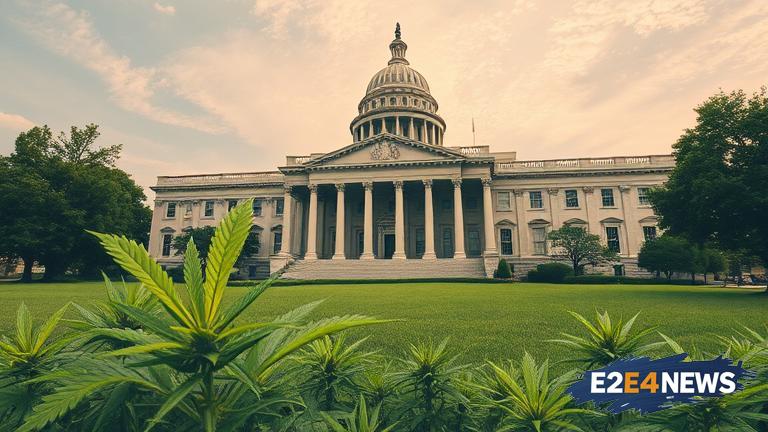The Texas Senate has taken a significant step towards reinstating a ban on THC, a psychoactive compound found in cannabis, as part of a broader effort to regulate the use of marijuana in the state. The bill, which has been met with both support and opposition, aims to prohibit the sale and possession of products containing THC, with some exceptions for medical use. Proponents of the bill argue that it is necessary to protect public health and safety, citing concerns about the potential risks associated with THC use, including impaired driving and increased risk of mental health problems. On the other hand, opponents of the bill argue that it is an overreach of government authority and that it will disproportionately affect certain communities, particularly those that rely on cannabis for medical purposes. The bill has sparked heated debate among lawmakers, with some arguing that it is a necessary measure to prevent the misuse of THC, while others see it as an attempt to undermine the will of the people, who have increasingly shown support for the legalization of marijuana. As the bill moves forward, it is likely to face significant scrutiny and opposition from various groups, including cannabis advocates, medical professionals, and civil liberties organizations. The Texas Senate’s decision to advance the bill has been seen as a setback for those who had hoped to see the state move towards a more permissive approach to cannabis regulation. Despite this, many remain hopeful that the bill will be amended or defeated in the coming weeks, allowing for a more nuanced and evidence-based approach to regulating THC. The use of THC has been a topic of controversy in Texas for several years, with some arguing that it has the potential to be a valuable tool for medical treatment, while others see it as a gateway to more serious substance abuse. As the debate over the bill continues, it is likely that we will see a range of opinions and perspectives on the issue, reflecting the complex and often conflicting views on cannabis and THC. The bill’s fate will likely be decided in the coming weeks, as lawmakers weigh the competing interests and arguments surrounding the issue. In the meantime, citizens and advocacy groups are urged to make their voices heard, as the outcome of this debate will have significant implications for the future of cannabis regulation in Texas. The state’s approach to regulating THC will be closely watched by other states and countries, as the global conversation around cannabis and its regulation continues to evolve. As more research emerges on the potential benefits and risks of THC, it is likely that we will see a shift in public opinion and policy on the issue. For now, the Texas Senate’s decision to advance the bill has set the stage for a contentious and closely watched debate, one that will have significant implications for the future of cannabis regulation in the state. The bill’s proponents argue that it is necessary to protect children and young people from the potential risks associated with THC, while opponents argue that it will drive the use of cannabis underground, making it more difficult to regulate and control. The issue of THC regulation is complex and multifaceted, involving a range of competing interests and perspectives. As lawmakers consider the bill, they will need to weigh the potential benefits and risks of THC, as well as the potential consequences of prohibiting its use. The use of THC has been shown to have a range of potential benefits, including reducing pain and inflammation, and improving sleep and mood. However, it also carries potential risks, including impaired cognitive function and increased risk of mental health problems. The bill’s fate will depend on a range of factors, including the level of public support for the measure, as well as the effectiveness of advocacy efforts by groups on both sides of the issue. As the debate over the bill continues, it is likely that we will see a range of creative and innovative solutions proposed, as lawmakers and citizens seek to find a balance between regulating THC and respecting individual freedoms. The Texas Senate’s decision to advance the bill has been seen as a significant setback for cannabis advocates, who had hoped to see the state move towards a more permissive approach to regulation. Despite this, many remain hopeful that the bill will be amended or defeated, allowing for a more nuanced and evidence-based approach to regulating THC. The issue of THC regulation is likely to remain a contentious and closely watched issue in the coming weeks and months, as lawmakers and citizens continue to debate the best approach to regulating the use of cannabis in Texas.
